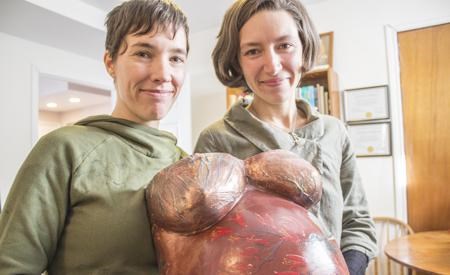While giving birth is no easy matter, giving birth to a midwifery practice in a remote area takes a special kind of grit, according to local midwives.
Celebrating 18 months of registered practice in the Powell River area, Elisha Manson and Sheena Nordman of Ten Moons Midwifery explained the challenges and triumphs of working in a remote area.
Although the midwives trained separately, Nordman in New Zealand and Manson at University of British Columbia, they came together to form a practice in Powell River. In turn, the two have become friends as well as colleagues, something they agreed was of benefit given the commitment required to work as a midwife.
“We were basically on call for a year and a half,” said Manson, “There is a requirement for two midwives to be present at home births, so with only two of us here we had to be available at all times.”
The midwives are two of 15 midwives working in remote areas of BC, representing just fewer than seven per cent of the total number working in the province, according to Midwives Association of BC.
Despite constantly being on call and available for young mothers, for midwives with experience working in busy practices there often was not enough work to go around in Powell River.
“I worked at one of the busiest practices in Vancouver,” said Nordman. “I attended 32 births in just over two and a half months.”
In Powell River, a low birthrate meant the two midwives only oversaw as many births in their first 18 months of practice as Nordman did in less than three months in the city.
“It can be difficult,” said Nordman. “You are expected to have the same insurance as practices in the big city, but you do not have the same workload.”
Despite the lower number of clients, working in Powell River has been positive so far, according to the midwives, because of a good work-life balance and the diverse nature of clientele.
“Unlike Vancouver, where you have a more predictably middle-class clientele, here you get to treat a more diverse group,” said Manson
Another benefit to seeing a midwife in Powell River as opposed to the Lower Mainland, said Manson, is there is no waiting list for expectant parents.
“People have sometimes called us as soon as they found out they were pregnant,” she said. “In fact, our clients can call and reach us any time. We have more time to talk and empower women to make choices that suit their
philosophies and values.”
Despite being billable under BC’s Medical Services Plan, the midwives said many clients didn’t realize anyone could choose to have either a doctor or a midwife oversee their pregnancy.
“We are available to anyone on the province’s Medical Services Plan,” said Manson. “We can do all medical care throughout a woman’s pregnancy and we can do home and hospital births.”
Despite offering full clinical services and being trained in reading blood work and ultrasounds, the midwives also had to do some work to overcome negative perceptions of midwifery.
“It was difficult at first getting across what we did,” said Manson, “especially in a community that has had some bad experiences with lay midwives.”
Manson added that differences between the roles of unregistered lay midwives and registered midwives initially caused some confusion.
As Powell River Division of Family Practice helps the midwives to promote continuity of care, both of them predict an upswing in births locally and more work as word about their services spreads.
“It is not a nine-to-five-type job and that is how I like it,” said Nordman. “It is not a career I am ever going to get bored of.”



